|
|
|
Sort Order |
|
|
|
Items / Page
|
|
|
|
|
|
|
| Srl | Item |
| 1 |
ID:
169283
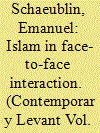

|
|
|
|
|
| Summary/Abstract |
Zakat is the Islamic obligation to give away a share of one’s moveable wealth for the sake of the community—primarily supporting people in need. Based on fieldwork in the Palestinian city of Nablus (2013–2014) where institutional channels for distributing zakat had become blocked due to security crackdowns in 2008, this article analyses direct zakat practices where givers and receivers confront one another in face-to-face interaction. In Nablus, openly displayed material want was assumed to ‘expose’ people living in poor households as well as their relatives and neighbours. Against this background, direct zakat manifested itself as discreet gestures of ‘covering’ need, while people not asking openly for support tended to be praised for their shyness and piety. In direct zakat transfers, people actively cared for how they appeared to one another in social interactions. This ‘ethical work’ of presenting oneself involved reading signs, embodying Muslim virtues and invoking God as the sole source of material provision. Considering the Islamic tradition’s presence within social interactions, this article seeks to understand how Muslim piety exceeds the individual and how the moral responsibility to cover the needs of others is socially distributed.
|
|
|
|
|
|
|
|
|
|
|
|
|
|
|
|
| 2 |
ID:
091809
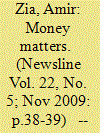

|
|
|
|
|
| Publication |
2009.
|
| Summary/Abstract |
The decentralised networks of militant groups have many sources of generating funds, including local and foreign Islamic charities, bank robberies and kidnappings for ransom, mainly in Karachi.
|
|
|
|
|
|
|
|
|
|
|
|
|
|
|
|
| 3 |
ID:
188963
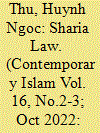

|
|
|
|
|
| Summary/Abstract |
Muslims in the Mekong River Delta are mainly ethnic Cham (one of 54 ethnicities in Viet Nam), living in An Giang Province. They adopted Islam in the early days. This religion has formed Cham characteristics in the community culture different from the Kinh (Vietnamese), Hoa (Chinese), and Khmer ethnic groups in the surrounding areas. This difference is due to the influence of religious views, especially the Islamic Sharia law. In reality, Sharia law is appropriately interpreted from the perspective of Cham Muslims, so it is simpler than the “orthodox” original law. Cham Muslims apply this simple interpretation in their religious life, especially in economic behavior and sharing benefits through their zakat practice. Based on ethnographic fieldwork in An Giang Province, this article analyzes the current understanding of Sharia law in the Cham Muslims community, the application of this understanding in economic behavior, and the fulfillment of zakat duties.
|
|
|
|
|
|
|
|
|
|
|
|
|
|
|
|
| 4 |
ID:
188964
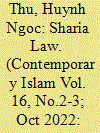

|
|
|
|
|
| Summary/Abstract |
Muslims in the Mekong River Delta are mainly ethnic Cham (one of 54 ethnicities in Viet Nam), living in An Giang Province. They adopted Islam in the early days. This religion has formed Cham characteristics in the community culture different from the Kinh (Vietnamese), Hoa (Chinese), and Khmer ethnic groups in the surrounding areas. This difference is due to the influence of religious views, especially the Islamic Sharia law. In reality, Sharia law is appropriately interpreted from the perspective of Cham Muslims, so it is simpler than the “orthodox” original law. Cham Muslims apply this simple interpretation in their religious life, especially in economic behavior and sharing benefits through their zakat practice. Based on ethnographic fieldwork in An Giang Province, this article analyzes the current understanding of Sharia law in the Cham Muslims community, the application of this understanding in economic behavior, and the fulfillment of zakat duties.
|
|
|
|
|
|
|
|
|
|
|
|
|
|
|
|
| 5 |
ID:
188965
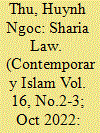

|
|
|
|
|
| Summary/Abstract |
Muslims in the Mekong River Delta are mainly ethnic Cham (one of 54 ethnicities in Viet Nam), living in An Giang Province. They adopted Islam in the early days. This religion has formed Cham characteristics in the community culture different from the Kinh (Vietnamese), Hoa (Chinese), and Khmer ethnic groups in the surrounding areas. This difference is due to the influence of religious views, especially the Islamic Sharia law. In reality, Sharia law is appropriately interpreted from the perspective of Cham Muslims, so it is simpler than the “orthodox” original law. Cham Muslims apply this simple interpretation in their religious life, especially in economic behavior and sharing benefits through their zakat practice. Based on ethnographic fieldwork in An Giang Province, this article analyzes the current understanding of Sharia law in the Cham Muslims community, the application of this understanding in economic behavior, and the fulfillment of zakat duties.
|
|
|
|
|
|
|
|
|
|
|
|
|
|
|
|
| 6 |
ID:
188966
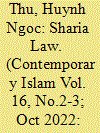

|
|
|
|
|
| Summary/Abstract |
Muslims in the Mekong River Delta are mainly ethnic Cham (one of 54 ethnicities in Viet Nam), living in An Giang Province. They adopted Islam in the early days. This religion has formed Cham characteristics in the community culture different from the Kinh (Vietnamese), Hoa (Chinese), and Khmer ethnic groups in the surrounding areas. This difference is due to the influence of religious views, especially the Islamic Sharia law. In reality, Sharia law is appropriately interpreted from the perspective of Cham Muslims, so it is simpler than the “orthodox” original law. Cham Muslims apply this simple interpretation in their religious life, especially in economic behavior and sharing benefits through their zakat practice. Based on ethnographic fieldwork in An Giang Province, this article analyzes the current understanding of Sharia law in the Cham Muslims community, the application of this understanding in economic behavior, and the fulfillment of zakat duties.
|
|
|
|
|
|
|
|
|
|
|
|
|
|
|
|
| 7 |
ID:
159372
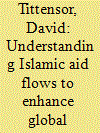

|
|
|
|
|
| Summary/Abstract |
In 2008 the then Organisation of the Islamic Conference established its own Islamic Cooperation Humanitarian Affairs Department (ICHAD) as an alternative to the OECD DAC. Subsequently, aid from ICHAD predominantly goes to Muslims. This is most likely because zakat is one of the five pillars of Islam and regarded as ibadah (worship), from which non-Muslims are excluded. As such, this paper will examine the theology and ethics of giving in Islam (zakat and sadaqa) and explore these aid flows and, and whether there is room for a more inclusive interpretation that can lead to greater integration and co-operation.
|
|
|
|
|
|
|
|
|
|
|
|
|
|
|
|
|
|
|
|
|